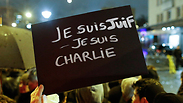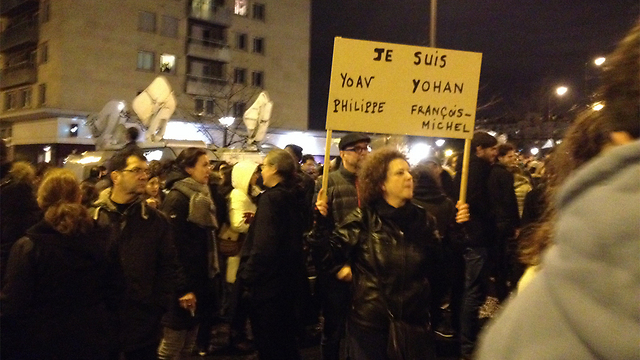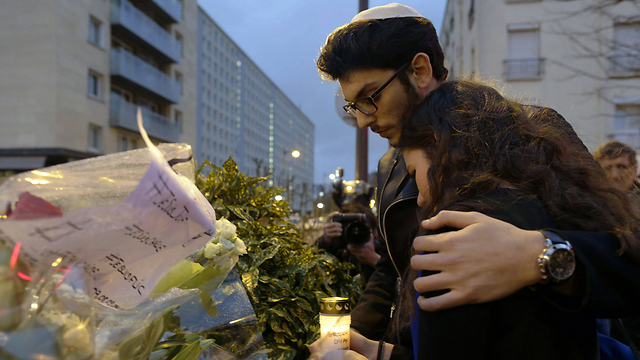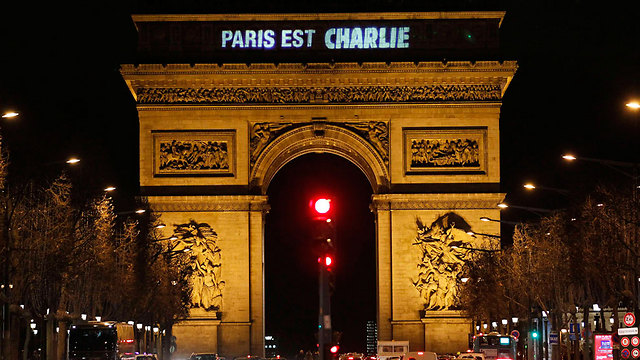
When Paris mourns
Analysis: The French are not grieving the murder of four Jews; they are grieving the murder of their values, afraid of losing something which is very important to them. The Jews are only marginal players in this affair
I was in New York the day after the September 11, 2001 attacks. It was similar but different. I covered our grief over Prime Minister Yitzhak Rabin's murder in 1995. It was similar but different.
The Americans were shocked to the bottom of their souls when they discovered that they were not immune to terror. The World Trade Center's Twin Towers, a symbol of America's strength, collapsed before their eyes.
They went out to seek revenge with blood and fire: Against Osama bin Laden, against the Taliban, against Saddam Hussein. America's big cities were filled with National Guard soldiers with all their equipment. They looked like an occupied territory.
The Israelis chose which Rabin they want to mourn – each person and his opinions, each person and his party. The rage quickly turned into tears, and the big fire – into candles.
The French mourn differently. Dozens – perhaps hundreds – of spontaneous rallies were initiated Saturday in different squares in France's cities. There was an increased presence of gendarmes in public places, but France continued to live its life. It wasn't occupied.
Thousands came to each square, stood silently for an hour and went home. The mourning will reach its peak on Sunday evening at a Paris rally, which is expected to be the biggest rally France has ever seen. Bigger than the student protests in 1968, bigger than the rally which marked the victory over Germany in World War II, and bigger than the storming of the Bastille prison in 1789, which announced the arrival of the French Revolution. It's no coincidence that the French government chose to launch Sunday's rally at the Place de la Bastille.
At this stage, they are mourning silently. Without crying, without protesting. Only holding signs with the names of the victims alongside the words "je suis" (I am).
I spoke to a senior French government worker on Saturday, a man who is closely following the way France is coping with this terror. I asked him to explain his people's response to me, a random guest.
"They are in shock," he said. "What amazed me was the extent of the solidarity, the depth of the emotion. It's not the 17 citizens who were murdered. It's the values that were murdered, the conventions that life here is built on. The French are afraid of losing something which is very important to them.
"Most of the French have never read the Charlie Hebdo satirical weekly. I doubt they ever heard of it. But the murder critically damaged their confidence in their way of life."
You are very familiar with the way the Israelis responded to terror attacks, I told him. What's the difference?
"There are two differences," he said, "and they both make the terror attacks in France more serious. In Israel, suicide terrorism was blind; it attacked indiscriminately. The attacks on the newspaper and the Jewish supermarket were intentional.
"And the main thing is that you dealt with terror that came from the outside. The same applies to the Americans. The terror in France comes from the inside. The perpetrators are French citizens, who were born or educated here, who speak French fluently, who are part of the French society. It's difficult.
"When the French wake up from their shock, they will ask themselves how we educated them. Some of them will demand religious or racial separation – removing the Muslims from the French society. It will be a different France."

These sentences require clarification. France believes in the supremacy of its culture, in the sacredness of the French language, in the rightness of French secularism. France it imposed its culture on the local population in every country it controlled. Whoever immigrated to France could be considered a full-fledged French person only if he gained a command of the French language, culture and history.
The French believed – like the forefathers of our Labor Movement – in the melting pot. They are unfamiliar with the multiculturalism, which has become fashionable in America. They have no problem banning women from wearing veils, and feeling that they are advanced and liberal.
The Muslims make up about 8% of the population today, and this percentage increases every year. A large part of them refuse to assimilate into the French culture. They view the secular values as unacceptable. They suffer economically and socially. In the margins, they become addicted to fundamentalism and terror.
Will France be able to remain France? This question is troubling many French people today. Does it explain the extent of the national grief?
The Jews are marginal players in this affair. The French are not mourning the four murdered Jews; they are mourning themselves.
'The Jews have a place to go to'
Many synagogues in Paris did not hold Shabbat prayers on Saturday. The worshippers were gripped with fear.
There are three synagogues located less than 200 meters (650 feet) from the attacked supermarket: A Moroccan one called Hatikva, a Sephardic one and an Ashkenazi one. These three synagogues decided not to give in to terror, and the prayers were held as planned.
Gendarmes, policemen-soldiers similar to our Border Guard, blocked off the section of the street with red and white emergency tape, like the scene of a terror attack. They were armed with rifles. Security guards hired by the community were also present. Every movement on the street made them jump up.
Haim, the Moroccan synagogue's manager, came in early. The building, which also serves as a Jewish school, was dark. He asked one of the policemen to act as a Shabbat gentile. The policeman didn't understand what it was all about, but turned on all the switches without any problem.
The initial attendance at the Shabbat morning prayer was poor. In the Ashkenazi synagogue there were only nine worshippers. I volunteered to be the tenth worshipper for a quorum, until reinforcement arrives. But within an hour, the occupancy rate went up.
"On a regular Shabbat the children play on the street," one of the worshippers said. "Now they're not allowed to. It's not the same."
"I'm not afraid," one of the worshippers shouted on the street. Another worshipper said quietly, "I was afraid and I got over it."
"We had a big miracle," says Haim Bibi, a father of five with the sixth child on its way. Since becoming religious, Bibi believes in miracles. He has naïve blue eyes and a big body, like a teddy bear.
What kind of miracle is it, I asked him, when innocent people die. "Imagine what would have happened if the terrorists had come to the Jewish school," he said. "They would have killed 200 children. There is someone up there who is taking care of us."
The owner of the grocery store located behind the attacked supermarket came in early to pray. He was born in Morocco. "There are different kinds of Muslims," he says. "The Moroccans are okay. They treat us with respect. The Tunisians are also okay. The Algerians are a big problem. They think France belongs to them.
"We, the Jews, have a place to go to," he says. "Where will be Muslims go? Back to Algeria?"
I asked him the obvious question. "Immigrating to Israel is difficult," he said. "The business is here. But I have bought an apartment in Netanya."
The same question was raised in my conversation with one of the most prominent rabbis of the Sephardic communities. He had a decisive answer: "One immigrates to Israel; one doesn’t flee to Israel."
The question why the government allows Muslims who traveled to Iraq, Syria or Yemen to return to France was raised in every conversation.
There are 1,200 French citizens who have had some kind of contact with Islamic terror organizations. Some of them haven't returned to France. Others came back and began a new life. Only a small minority volunteered for action in France, on behalf of the organization or on behalf of themselves. French law does not allow the government to ban their entry to France. It can only deport people who don't have a citizenship.
But the Jews in the synagogues don't care about that. They are furious with what they interpret as the left's weakness.
"Marine Le Pen is the best," said an elderly worshipper at the Ashkenazi synagogue. But her father is a Holocaust denier, I protested. The man, a Holocaust survivor, shrugged. "That was 40 years ago," he said. "I care about what happens tomorrow."
'Israel is not part of this'
In Israel, the scene of every terror attack is cleaned within an hour. The speed is part the Israelis' way of coping, their refusal to sink into their grief.
In France there is no rush. The stores in the buildings are closed, the cars in the parking lot are standing still, and roses wrapped in cellophane are piling up on the opposite pavement. Men and women approach the pile with great intentions and place a rose on it. It's extremely beautiful, very sad and desperate.
Yedioth Ahronoth's correspondent in Paris, Lior Zilberstein, and I listen to survivors' testimonies. Two guys who were smoking a cigarette outside the supermarket spotted the terrorists and alerted the police. They have been standing near the scene of the attack for hours, bursting with emotions. One of the guys has red eyes. The other one is tense. They don’t want to stay there and they can't leave.
A protest, or a mourning rally to be more exact, gathered outside the supermarket before sunset. It was sponsored by the Jewish organizations, and thousands arrived, in the cold and in the rain.
The victims' names were written on signs. "I am Yohan Cohen," "I am Jewish," "I am the Republic," "I was murdered for being Jewish."
Occasionally, a group in the audience tried to sing "La Marseillaise," the national anthem. The crowd wasn't swept away. Another person tried "Hatikva," Israel's national anthem. He remained on his own.
On the sidelines of the rally, an argument broke out between a young right-wing Jewish man and a left-wing Jewish woman. He demanded to kill, deport, arrest all the Muslims, and she insulted him. He screamed. She screamed.
They were later joined by a woman who shouted, "The problem is that they aren’t doing anything. We are being murdered and they don’t care."
"They are crazy," said the left-wing woman. "They are barely 200 people, but they are acting as if they are the majority."
"You've probably noticed that there are no flags at the rally, neither of France nor of Israel," she said to me.
Why is that, I asked.
"Israel is not part of this," she said.
I told her that Prime Minister Benjamin Netanyahu and Ministers Avigdor Lieberman and Naftali Bennett would be arriving for Sunday's rally.
"You're kidding me," she said. "What business is it of theirs?"












